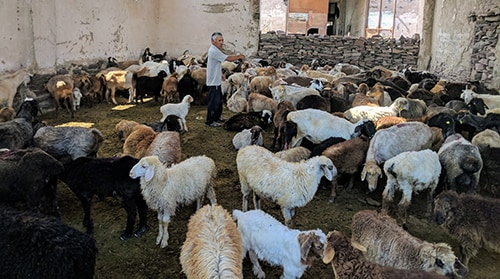At a glance
CDC established a Global Disease Detection office in the Republic of Kazakhstan in 1995 and expanded operations ten years later with funds from the U.S. President’s Emergency Plan for AIDS Relief (PEPFAR). Since that time, CDC has opened additional field offices in the Kyrgyz Republic, the Republic of Tajikistan, and the Republic of Uzbekistan. CDC has established strong partnerships with ministries of health (MOHs) and partner organizations in Central Asia to build effective collaborations to detect, prevent, and respond to public health threats. Program areas address global health security, HIV, One Health, and strengthen capacity to respond to disease outbreaks. CDC’s work aims to protect the health of Americans and support public health around the world.
Key accomplishments

- Established the National Center for Antimicrobial Resistance in Uzbekistan in 2017 where surveillance and antimicrobial susceptibility testing is conducted.
- Facilitated 17 regional laboratories in achieving international standard accreditation (ISO:15189) in Kazakhstan and the first international standard accreditation (ISO:17043) for a laboratory in Kyrgyzstan. In 2025, supported an Uzbekistan virology reference laboratory to achieve international accreditation (ISO:15189).
- Conducted over 400 epidemiological investigations,155 disease surveillance system evaluations, and over 200 outbreak investigations across Central Asia.
- Established Public Health Emergency Operations Centers across four Central Asian countries.
Global health security
CDC's global health security work in Central Asia focuses on strengthening disease outbreak response, surveillance, laboratory systems, and workforce development.
Surveillance systems
CDC provides technical expertise and cooperates with the ministries of health in Central Asia on infectious disease forecasting, geographic information systems, and advanced analytical methods, including spatial analysis. These technology and training efforts improve regional public health capacity and increase collaboration and data-sharing among local, national, and international partners.
Laboratory strengthening
CDC is strengthening the capabilities of public health and hospital-based laboratories of the MOHs in Central Asia. CDC supports regional- and reference-level laboratories with:
- Workforce development
- Improving quality management systems
- Monitoring for and testing respiratory viral pathogens of pandemic potential
- Establishing laboratory testing algorithms for especially dangerous pathogens
- Laboratory equipment and reagents
- Whole-genome sequencing of priority diseases, including healthcare-associated infections (including antimicrobial resistance), zoonotic diseases, and diseases of pandemic potential
Workforce development
CDC supports training public health professionals through the Field Epidemiology Training Program (FETP). The Central Asia FETP was established in 2003 as a two-year residency program, with support from CDC and MOHs in Central Asia. FETP consists of three levels of training: frontline, intermediate, and advanced.
CDC started the Global Laboratory Leadership Program (GLLP) to support the development of human resources for laboratory services in Kazakhstan in 2023. Participants learn essential skills in laboratory leadership. Multidisciplinary and multisectoral participant cohorts are encouraged to support the integration of the One Health approach at all levels of national health laboratory systems. CDC provided technical support to establish a Laboratory Training Center at the Scientific Practical Center for Sanitary Epidemiological Expertise and Monitoring of National Center for Public Health.
Emergency response
The CDC Central Asia offices help strengthen emergency preparedness by training staff across government agencies, supporting cross-sectoral collaboration, and helping to develop emergency preparedness guidelines. CDC collaborates with partners to enhance border health management in response to COVID-19 and other communicable diseases.
HIV
As a key implementer of PEPFAR, CDC plays an essential role in the fight against HIV in Kazakhstan, Kyrgyzstan, and Tajikistan. With unmatched scientific and technical knowledge and long-standing partnerships with MOHs, CDC is uniquely positioned to advance HIV activities that keep Americans safe at home and abroad.
CDC’s work in the region supports people living with HIV to access treatment, saving lives and preventing transmission.
Through PEPFAR, CDC provides critical support to countries’ public health infrastructure and workforce, improving their ability to prevent, detect, and respond to not just HIV, but other infectious diseases, minimizing their risk from entering the U.S.
Read more about CDC's HIV work in Central Asia:
One Health
One Health is a collaborative, multisectoral, and transdisciplinary public health approach. One Health seeks to achieve optimal public health outcomes by recognizing the interconnection between people, animals, plants, and their shared environment. Across several regions in Kazakhstan, CDC helped enhance Crimean-Congo hemorrhagic fever surveillance by investigating its occurrence among humans, animals, and ticks.
CDC also helped develop a national One Health Program, implemented the One Health Zoonotic Disease Prioritization Tool, and helped the country with a Prime Ministerial decree initiating a One Health coordinating body linking the Ministries of Health, Agriculture, and Ecology in Uzbekistan.
Success story spotlight
Hope and Healing: The Role of Methadone Clinics in HIV Treatment in the Kyrgyz Republic

Olga Anatolievna Gritsak has been a dedicated nurse for 53 years, with the last 17 spent at the Opioid Substitution Therapy (OST) Clinic at the No.2 Republican Center for Psychiatry and Narcology (RCPN) in Bishkek. She is more than a nurse to her 58 patients; she is a compassionate figure, known as a caring babushka, who opens the clinic early every morning to dispense methadone and is the last to leave at night.
The OST clinic provides a lifeline for people who inject drugs, offering oral methadone treatment to help them stop injection drug use. These clinics are critical for patients who are often isolated due to severe stigmatization, providing not only medical care for hepatitis C and HIV/AIDS but also essential mental health and social support. The aim is to stabilize patients on methadone, improve their overall health, and help them reintegrate into society, thus reducing the risks associated with injection drug use.
Despite the supportive environment within the clinic, stigma and discrimination against people who inject drugs and people living with HIV/AIDS remain pervasive in the Kyrgyz Republic. Barriers to accessing these vital services include self-stigma, social discrimination, and the frequent unlawful detention of OST clinic patients by law enforcement, which deters many from seeking treatment.
CDC has been active in the Kyrgyz Republic since 2011, supported by the U.S. President’s Emergency Plan for AIDS Relief (PEPFAR). The CDC collaborates with the Ministry of Health’s Republican Center for Bloodborne Viral Hepatitis and HIV Control (RCBVHHC) and RCPN to enhance HIV prevention, counseling, and testing. Their efforts also focus on strengthening laboratories, HIV care and treatment, strategic information systems, and other public health functions.
Despite challenges, the work of dedicated individuals like Olga ensures that hope and healing remain possible for those affected by drug addiction and HIV/AIDS in the Kyrgyz Republic.

![[thumbnail] (hidden)](/global-health/media/images/2024/12/Central_Asia_FS_2024_thumbnail.jpg)




